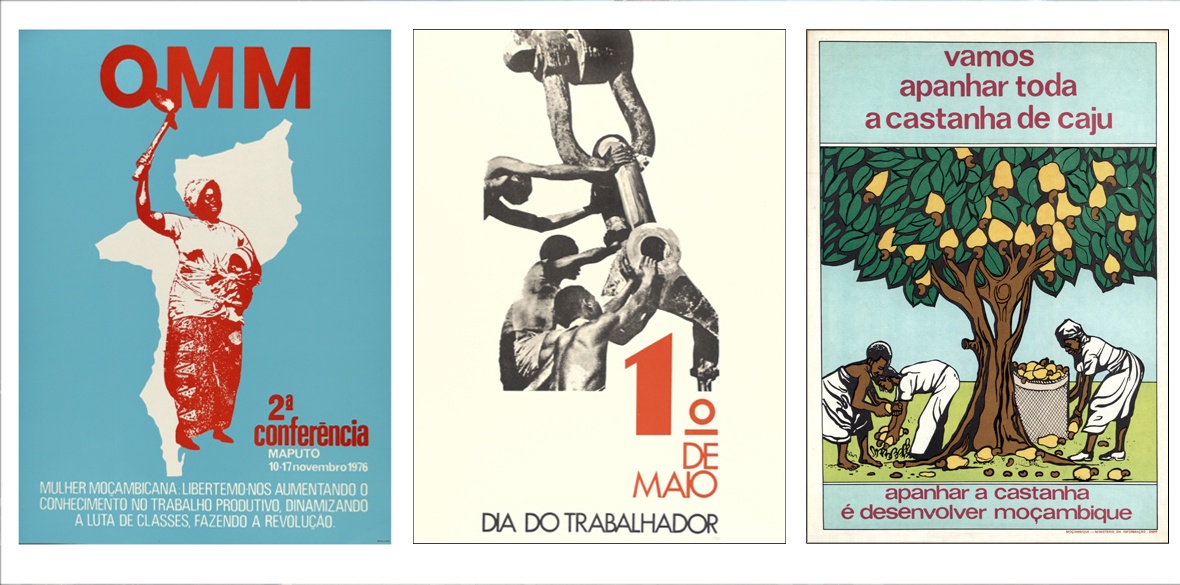This is the last article you can read this month
You can read more article this month
You can read more articles this month
Sorry your limit is up for this month
Reset on:
Please help support the Morning Star by subscribing here
Our Sophisticated Weapon: exhibition of Mozambican revolutionary posters
Brunei Gallery, Soas, University of London
THE Our Sophisticated Weapon exhibition’s title is from a 1982 speech by President Samora Machel, in which Mozambique’s post-independence leader (1975-86) spoke of Frelimo’s (Liberation Front of Mozambique) socialist Sociedade Nova (New Society).
He described it as under construction by the Marxist-Leninist ruling party, Frelimo, explaining that its citizens were striving to transform themselves into incarnations of the Homem Novo (New Man). This society was nossa arma sofisticada (our sophisticated weapon).
It was Frelimo’s answer to accusations by the neighbouring apartheid regime that Mozambique had weapons of mass destruction, supplied by communist powers, aimed across South Africa’s border.
The 25 posters in the exhibition were mostly designed by a team of artists at the DNPP (National Directorate of Propaganda and Publicity).
Their brightly coloured images and upbeat captions suggest an alternative to the current dominant view of socialism as a negative phenomenon.
Instead, viewers are offered a glimpse of its vibrancy in Mozambique during the years in question, when it held the promise of a better life for the population than the
exploitation of man by man.
The Sociedade Nova sought to replace 500 years of colonial oppression, during which the interests of the Portuguese settler-elite had eclipsed those of the African majority.
At the height of the colonial system in the mid-20th century, most Mozambicans were formally categorised as uncivilised, their only route to citizenship the legal process of assimilation.
This entailed proving to the colonial authorities that they had abandoned the longstanding practices of their diverse African communities in favour of European culture.
Now Frelimo’s sophisticated weapon began to eliminate the poverty to which they had been condemned. Instead of being a labour reserve for the settler colonialists, Um So Povo (One Single People) set out to achieve prosperity via the worker-peasant alliance.
The introduction of universal health and education services accompanied its efforts. Most importantly, Machel pledged in speech after speech that no Mozambican should go hungry or barefoot.
Frelimo’s socialist project came to grief in the mid-1980s. A combination of external destabilisation, internal dissent and the party’s inexperience in government led to war with the opposition group, Renamo (Mozambican National Resistance).
The internecine conflict wrecked Mozambique’s economic and social infrastructure, leaving approximately one million dead and five million displaced from a population of 14.5 million.
The statistic compares dramatically with WWII 66,375 civilian deaths from the c50 million population of the UK.
When the Soviet bloc collapsed in 1989, president Joaquim Chissano, Machel’s successor, had no option but to rely on Western support in the shape of the IMF and World Bank.
Frelimo’s turn away from socialism has resulted in the elision from history by most commentators of its achievements during the Marxist-Leninist years.
Instead they are depicted as an aberration. Even Frelimo itself, relaunched after 1990 as a democratic rather than Marxist-Leninist party, has dismissed them.
For example, historians have called previously dominant narratives about its achievements a “simplistic fable” or questionable “liberation script.”
Post-1990 Frelimo’s version of its early independence history has been described as a form of “mnemonic legitimation” and the ambience of Machel’s regime a “collective hallucination.”
However, at the time, Our Sophisticated Weapon was considered an emergent, actually existing alternative to capitalism and imperialism by progressive rulers, solidarity movements and individuals around the world.
The culture of Machel’s People’s Republic challenged, in particular, the racist and capitalist legal system of South Africa.
The New Society’s threat to the white minority regime can be compared with that of Fidel Castro’s Cuba to the US, except that in the South African case a mere land border separated them.
Thousands of internationalist co-workers (volunteers) went to help, while opponents considered the Sociedade Nova enough of a threat to justify supporting Renamo.
The poster exhibition is a reminder that though the Sociedade Nova’s historical moment has become neglected, when Judgement Day comes the past will come into full possession of its meaning, to paraphrase Walter Benjamin.
Ends December 11 2021. Free but tickets must be booked at soas.ac.uk/gallery. Richard Gray is co-curator of Our Sophisticated Weapon: exhibition of Mozambican revolutionary posters and PhD candidate at Soas, London.










